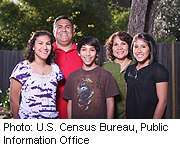
WEDNESDAY, March 28 (HealthDay News) — The obesity rate among Mexican-American adults aged 20 to 74 increased from about 21 percent to nearly 35 percent between 1982 and 2006, a new federal report reveals.
In addition, the analysis of data from the U.S. National Health and Nutrition Examination Surveys (NHANES) and the Hispanic Health and Nutrition Examination Survey showed that Mexican-American adults born in the United States had a higher rate of obesity than those born outside the country.
And the obesity situation does not seem to be improving, based on the results of a recent NHANES study that reported that obesity prevalence had increased in 2009-2010 to over 40 percent among Mexican-American adults over 20 years of age, according to a news release from the U.S. Centers for Disease Control and Prevention (CDC).
The new findings, published Wednesday in the CDC’s National Health Statistics Reports, also revealed that the diabetes rate among Mexican-Americans aged 20 to 74 rose from 9.7 percent to 13.7 percent during the 1982-2006 study period.
Cheryl Fryar, of the U.S. National Center for Health Statistics, and colleagues noted that women consumed more carbohydrates than men in all the survey years but, overall, the consumption of carbohydrates increased from nearly 46 percent to 51 percent of calories among Mexican-American men and women.
Other findings on dietary and health changes among Mexican-Americans over the 25-year period include:
- Protein consumption declined from about 17.3 percent to 15.8 percent of calories, and total fat intake decreased from 35.5 percent to under 32 percent of calories.
- The prevalence of high blood pressure remained relatively stable during the study period at about 22 percent.
- The percentage of Mexican-American adults with cavities fell from 90 percent to 83 percent.
“Monitoring trends in diet and health conditions among Mexican-American adults can inform the development of targeted prevention efforts to improve the health of this rapidly increasing population,” the authors concluded in the report.
More information
The U.S. Centers for Disease Control and Prevention has more about Mexican American health.

